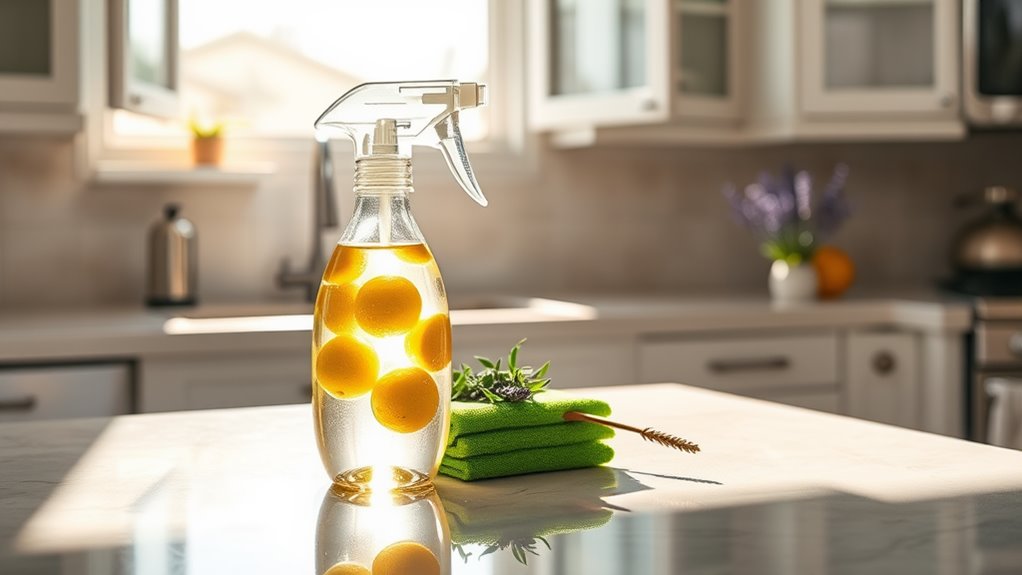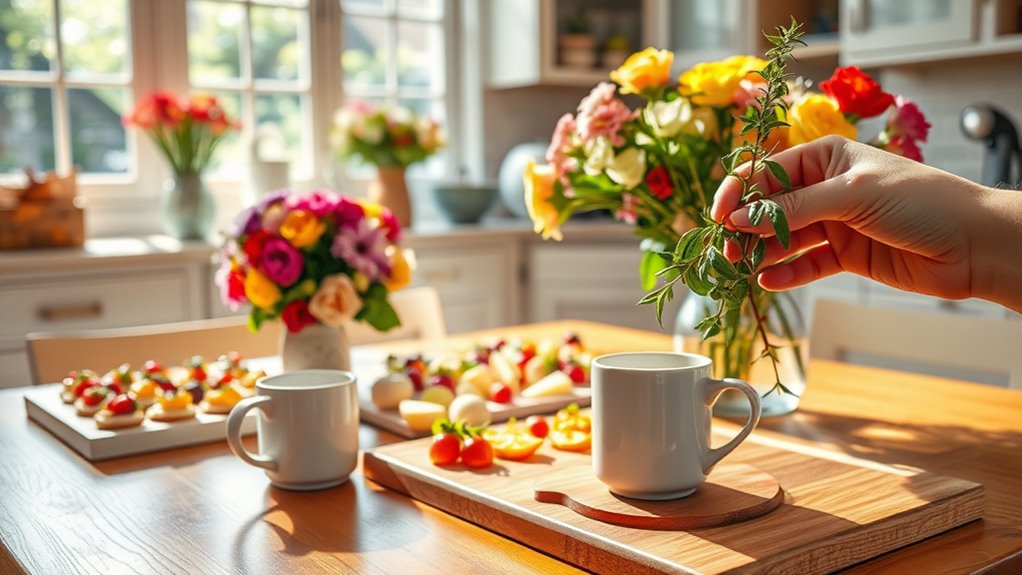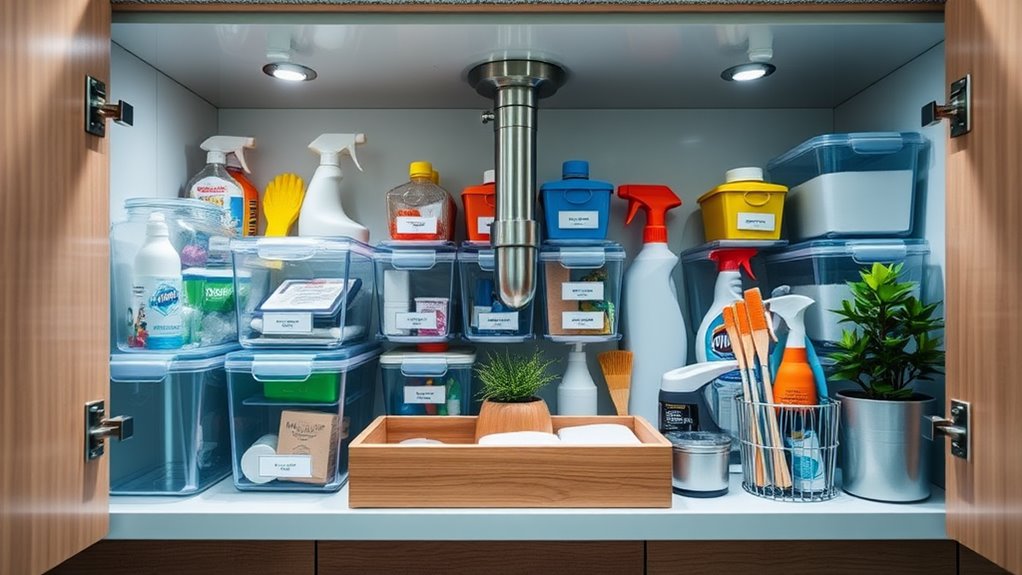How to Disinfect Your Kitchen Without Strong Chemical Smells
To disinfect your kitchen without strong chemical smells, use natural ingredients like vinegar, baking soda, and lemon juice. These powerhouses cut through germs and odors while leaving a fresh scent. Simply clear your surfaces, wipe them down, and apply your chosen disinfectant. Let it sit for about 10 minutes before rinsing and drying. Remember to maintain this chemical-free approach by regularly decluttering and choosing organic ingredients. There’s more to discover about safe practices for your kitchen!
Key Takeaways
- Use natural disinfectants like vinegar and essential oils to eliminate germs without harsh chemical odors.
- Incorporate steam cleaning methods to sanitize surfaces effectively without using any chemicals.
- Mix lemon juice and baking soda for a powerful, fresh-smelling cleaner that tackles tough stains.
- Ensure proper ventilation by opening windows to promote airflow and reduce lingering smells.
- Store natural cleaners in labeled, airtight containers to maintain their effectiveness and avoid accidents.
Benefits of Natural Disinfectants
When you’re looking to keep your kitchen safe and clean, natural disinfectants offer a range of benefits that can enhance your cleaning routine.
Opting for chemical-free disinfecting not only protects your health but also the environment. These natural alternatives, such as vinegar and essential oils, effectively eliminate germs without leaving harmful residues. In fact, using steam cleaning methods is another effective way to sanitize surfaces without chemicals. Additionally, using hydrogen peroxide solutions can provide an extra layer of disinfection for stubborn germs. Natural disinfectants like citrus extracts are also known for their antibacterial properties, making them an excellent choice for kitchen surfaces.
You’ll appreciate the fresh scents that linger, rather than the overpowering chemical smells of traditional cleaners. Plus, using these ingredients can save you money in the long run, as they’re often less expensive and more versatile.
By mastering natural disinfectants, you’ll cultivate a healthier kitchen space, ensuring your food preparation areas remain safe for your family. Additionally, using an eco-friendly all-purpose cleaner can simplify your cleaning tasks and maintain the shine on various kitchen appliances.
Embrace this approach, and you’ll feel empowered in your cleaning endeavors.
Effective Ingredients for a Fresh Clean
Natural disinfectants provide a solid foundation for maintaining a clean kitchen, but knowing which ingredients to use can enhance your cleaning efforts even further.
Vinegar stands out as a powerful foe against bacteria and odors. Its acidity breaks down grime while leaving a fresh scent, making it a staple in DIY countertop cleaning. Additionally, vinegar is an effective eco-friendly bathroom cleaner that can be utilized in various cleaning tasks around the home. Moreover, vinegar is known for its natural cleaning alternatives, making it a popular choice for those looking to avoid harsh chemicals. Using a vinegar cleaner is not only budget-friendly but also reduces the impact of harmful substances on the environment.
Baking soda, a versatile hero, tackles tough stains and neutralizes odors; sprinkle it on surfaces before scrubbing.
Lemon juice not only cuts through grease but also adds a bright, invigorating aroma.
Essential oils, like tea tree or lavender, bring antibacterial properties and delightful scents, elevating your cleaning experience. By incorporating essential oils into your cleaner, you can create an even more effective and pleasant solution that keeps your kitchen sparkling clean and fresh without harsh chemical smells.
Step-by-Step Disinfection Techniques
Disinfecting your kitchen can be broken down into five simple steps that guarantee every surface is thoroughly cleaned. Follow this guide to guarantee maximum effectiveness:
| Step | Action |
|---|---|
| 1. Clear Surfaces | Remove all items from countertops. |
| 2. Wipe Down | Use a damp cloth to remove debris. |
| 3. Apply Solution | Spray your chosen disinfectant evenly. |
| 4. Let Sit | Allow the solution to sit for 10 minutes. |
| 5. Rinse & Dry | Wipe with a clean, dry cloth. |
Using natural ingredients like vinegar or essential oils can enhance your kitchen sanitization efforts while avoiding harsh chemical smells. Additionally, incorporating safe and effective DIY cleaners can provide a more pleasant cleaning experience without compromising on cleanliness. For instance, vinegar is known for its antimicrobial properties, making it an excellent choice for disinfecting your kitchen surfaces naturally. Proper disinfecting techniques can further ensure that your cleaning routine is both effective and eco-friendly. You can also create your own eco-friendly bathroom cleaners that are effective in other areas of your home.
Tips for Maintaining a Chemical-Free Kitchen
Maintaining a chemical-free kitchen is easier than you might think, especially when you incorporate simple practices into your routine.
Start by opting for natural cleaning agents like vinegar and baking soda; they’re effective and safe. Regularly declutter your kitchen to minimize grime build-up, and always wipe down surfaces promptly after use.
Invest in reusable cloths instead of disposable ones to reduce waste and chemical exposure. When cooking, choose organic ingredients whenever possible to keep harmful residues at bay.
Encourage airflow by opening windows while you cook or clean, which helps eliminate odors and pollutants.
Finally, embrace the power of essential oils for pleasant scents; they not only freshen your space but also offer natural antibacterial properties. Additionally, consider making your own eco-friendly all-purpose cleaner for versatile and non-toxic cleaning solutions throughout your kitchen.
Safe Storage and Usage of Natural Cleaners
When you choose to use natural cleaners in your kitchen, it’s essential to store and handle them safely to maximize their effectiveness and prevent any accidents.
To guarantee you’re using these cleaners wisely, follow these key storage tips:
-
Keep them out of reach*: Store cleaners in a high cabinet to prevent *accidental ingestion by children or pets.
-
Label containers clearly: Clearly mark all containers to avoid confusion and guarantee safe usage.
-
Use airtight containers: Protect the integrity of your cleaners by sealing them in airtight jars to maintain potency.
-
Store in a cool, dark place: Light and heat can degrade natural ingredients, so keep them away from direct sunlight.
Frequently Asked Questions
Can I Use Vinegar on All Surfaces in My Kitchen?
You can use vinegar on many kitchen surfaces, but avoid it on natural stone like granite or marble. It’s effective against bacteria and odors, making it a versatile choice for cleaning most areas safely.
Are Natural Disinfectants Safe for Food Contact Surfaces?
Yes, natural disinfectants like vinegar and baking soda are safe for food contact surfaces when used properly. Just make certain you rinse surfaces thoroughly after disinfecting to remove any residue and maintain a clean environment for food preparation.
How Often Should I Disinfect My Kitchen?
You should disinfect your kitchen surfaces daily, especially after food preparation. For high-touch areas, like countertops and handles, aim for multiple times a day. Regular cleaning guarantees a hygienic space, reducing the risk of foodborne illnesses.
What Are the Best Essential Oils for Disinfecting?
For effective disinfecting, consider using essential oils like tea tree, eucalyptus, and lavender. These oils possess natural antibacterial properties, making them ideal for keeping your kitchen fresh and safe without harsh chemical odors.
Can I Make Disinfectants Ahead of Time?
Yes, you can absolutely make disinfectants ahead of time. Just guarantee you store them in airtight containers, away from sunlight. This way, you’ll maintain their potency and effectiveness whenever you’re ready to use them.



